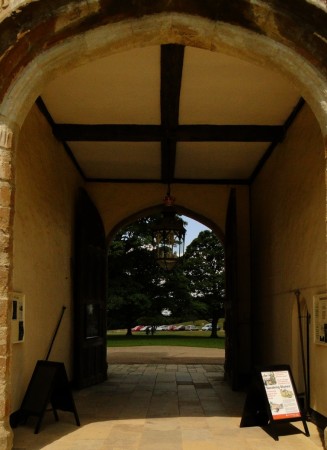Pilacita Pluckrose came from an unusual marriage: Knole’s cook and the valet to the Spanish Ambassador. She grew up between Knole and Spain in the 1920s and 1930s, and remembers here the problems that caused as well as life at Knole.
Pilacita Pluckrose
Daughter of Knole's cook and the valet to the Spanish Ambassador
Interviewed by Daphne Eatwell
Pilacita's parents
What time are we talking about, was it before the war, during the war, or after the war when you were at Knole?
P.P.: Before the war. But you see, mother sent me to boarding school. I wasn’t always there, you see, only on the holidays.
How old were you when you went to boarding school?
P.P.: 8
Oh, quite young.
P.P.: Yes.
Did your father live in England?
P.P.: He must have done because he was Spanish Ambassador, so they would be backwards and forwards wouldn’t they.
Ah, a Spanish Ambassador in England, yes of course. And that’s why he was visiting Knole and that’s how your mother met him.
P.P.: Yes. The big trouble was they didn’t like her, his family, because he’d married a foreigner. So there was a bit of friction there.
And then maybe they went back to live in his country?
P.P.: Yes, because we were in Spain when I was 6. I remember vividly my mother couldn’t speak Spanish much and I used to speak for her.
So, you went to live in Spain and you came back when you were 8? When your mother met your father, was she already a cook at Knole?
P.P.: Yes.
So she went to Spain and then came back and was a cook again at Knole?
P.P.: Yes. Perhaps that’s why she went to Spain to meet his family. But they didn’t like her because she wasn’t Spanish.
Life at Knole
When you played, whereabouts did you play, in the garden or…?
P.P.: All around, I remember my mother saying that the other servants said ‘I don’t know why you let Pilly’ – that was my pet name; my father called me Pilly – ‘play out. Aren’t you afraid somebody will attack her?’ She said ‘nobody will touch her’. There was Canute the dog, and they wouldn’t. He was a great guard dog
He was an Alsatian was he? German shepherd they call it now. Oh, that was good. So you all played with the dog. That’s lovely. Your mother was the cook?
P.P.: Yes – she’d been with the Sackvilles a long time because she used to travel with them, on holidays and that, because they used to take their own cooks.
P.P.: Another chap I remember was Mr. and Mrs. Pattenden. They were at the gate and let people in or out. And their son, I think his name was Jack; he used to go up to the tower and put the flag out when they were in.
P.P.: I remember that well because I used to say ‘can I come up with you?’
And that was a Mr Pattenden? I don’t think we’ve come across any of his relations.
P.P.: They lived right in the front.
In this tower place, yes, on each side.
Because your mother would have her own apartment there.
P.P.: Yes, just as you go in the entrance, it was on the right, there was a door, our front door.
Was that opposite the Pattendens?
P.P.: Yes.
They were on one side and you were on the other side? And did she have a kitchen there?
P.P.: Oh yes, and we did. It was like having your own little flat.
That was nice, and to have all that ground.
P.P.: The deer used to come right up; I remember the deer.
Leaving Knole
P.P.: I think that was the end of Knole really, because then I went to a convent and worked in a laundry, in this convent, and then the war started and because we were children of foreign parents we had to move in the coast 15 miles. I remember my mother got very upset because she wrote to Victoria Sackville-West and said about me and my nationality and was I alright to live in England. They said yes, that I could claim British citizenship because I was of a…
Mixed nationality?
P.P.: And I was born in this country.
I just wondered how old you would’ve been when you stopped going to Knole?
P.P.: I should think I would have been about 14.
Oh right, so quite a long time we’re talking about, because you were 8 when you went to school. Up to the time of 8, you had lived at Knole?
P.P.: Yes – because when we came back I was 6 when we left Spain.







No Comments
Add a comment about this page